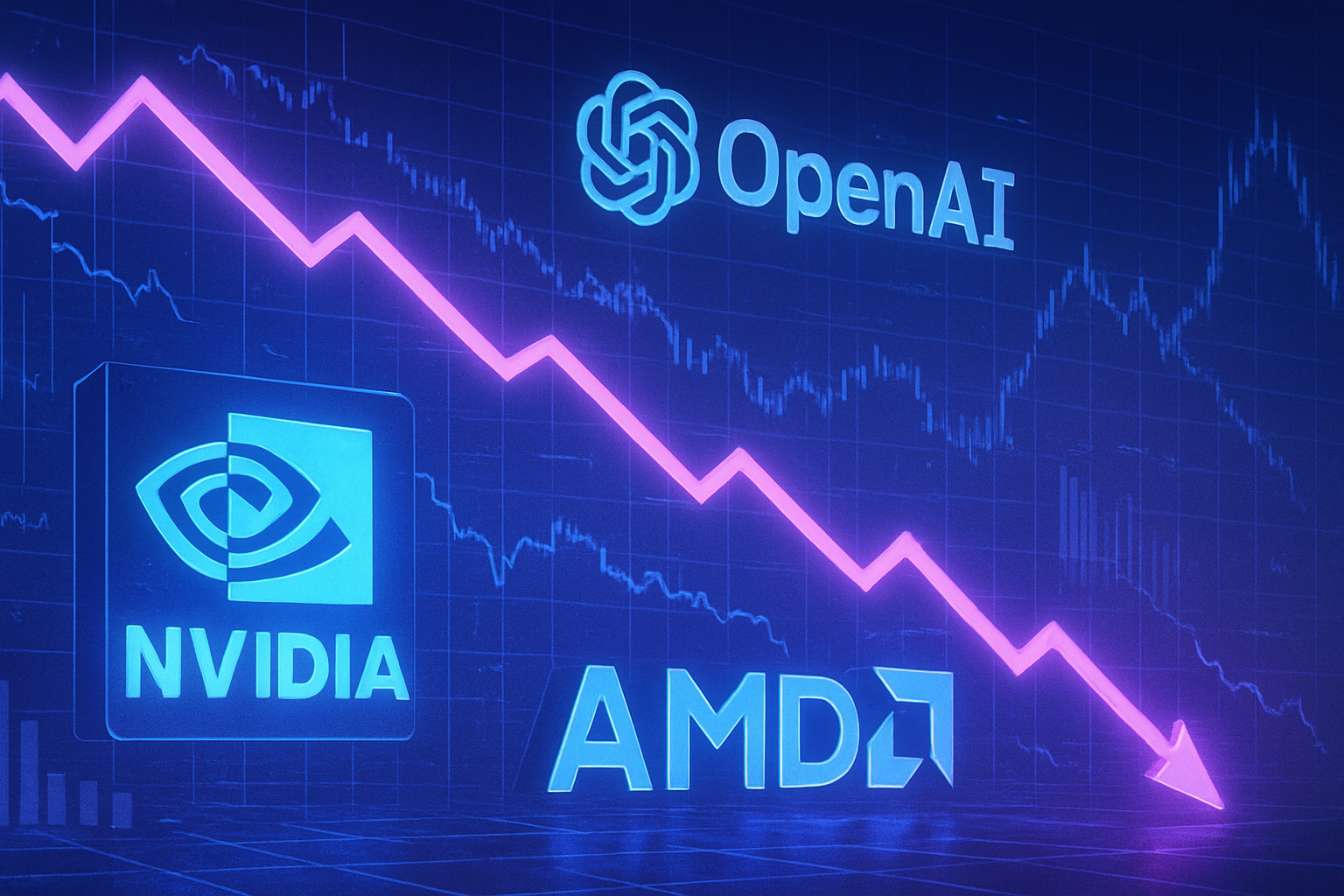Nvidia and AMD are experiencing a significant downturn in the semiconductor market. The announcement of OpenAI as a new strategic client for Broadcom reshuffles the deck. This development destabilizes both giants in the face of rising expectations regarding their innovation and positioning. OpenAI, a pioneer in the field of AI, is now asserting its dependence on Broadcom, raising concerns among its competitors. The future of computer hardware, centered around AI, has dramatic consequences for the financial prospects of the involved players.
Nvidia and AMD in decline: the rise of Broadcom with OpenAI
The dynamics of the semiconductor market have recently taken a significant turn. Broadcom recorded a strong surge in its shares following reports that OpenAI had become a major client of its technology. This alliance could transform the competitive landscape of the industry, particularly affecting Nvidia and AMD, which have seen their shares drop by more than 1%.
Broadcom and OpenAI: a promising partnership
OpenAI, known for its advancements in artificial intelligence, has signed a substantial contract with Broadcom, involving the order of customized chips worth $10 billion. This decision significantly improves Broadcom’s revenue prospects for 2026, leading to a surge in the company’s stock. OpenAI will use these new chips for its internal operations, strengthening its independence from Nvidia.
The market reaction: Nvidia and AMD under pressure
Nvidia, due to its focus on the data center sector, is now reportedly concerned about the impact of this collaboration. With only three major clients accounting for over 50% of its hardware sales, the potential loss of OpenAI could have notable consequences on its revenue. Concerns are growing about the possibility of a supply crisis as demand for cutting-edge technologies continues to rise.
Analysts have also noted that statements from Nvidia’s CEO, Jensen Huang, attempt to downplay the impact of customized ASIC chips. According to him, the diversity of Nvidia’s products and their availability in various markets provide it with an undeniable competitive advantage.
Economic forecasts and their influence on the market
Recent data from the US labor market has solidified fears of an economic slowdown, resulting in fluctuations in financial markets. ETFs tracking major US stock indices have begun to show signs of a rise, while short-term bond yields are falling, indicating that markets expect a potential reduction in interest rates by the Federal Reserve.
The growth of non-farm jobs has remained below expectations, adding pressure on companies like Nvidia and AMD. The rise in the unemployment rate to 4.3% serves as a reminder that supply factors heavily influence current economic dynamics. Revisions of employment figures from previous months further highlight the instability in the market.
Implications for the AI industry
The partnership between Broadcom and OpenAI could reshape the landscape of the artificial intelligence industry. Companies like Alibaba, which also benefit from significant advancements in AI, are experiencing impressive stock performances. This competitive climate encourages companies to innovate further and diversify to adapt to rapid market changes.
Experts emphasize that the growing dependence on advanced technologies and algorithms raises questions about the security tied to these collaborations. Other concerns arise from the increasing reliance of governments on these technologies, as evidenced by the early deployment of algorithms by various governments.
Conclusion on Lululemon’s situation
Lululemon, another company under pressure, saw its shares fall by 13% following an announcement that lowered their forecast for the entire year. Margins are threatened by rising costs, exacerbating the challenges the brand faces in a competitive market. This case illustrates the risks present for companies, even well-established ones, in the face of economic uncertainties.
Common Frequently Asked Questions
Why are Nvidia and AMD’s stocks falling after Broadcom was announced as OpenAI’s supplier?
The stocks of Nvidia and AMD are falling due to fears that losing OpenAI as a client for their products could impact their revenues, especially after Broadcom secured a $10 billion contract to supply customized chips to OpenAI.
What is OpenAI’s significance to Nvidia and AMD in the chip sector?
OpenAI represents a significant share of sales in Nvidia’s data centers, and its loyalty to Nvidia could have guaranteed stable revenues. The break in this relationship could therefore reduce the revenue of both Nvidia and AMD.
How does Broadcom’s announcement affect Nvidia’s revenue prospects?
With Broadcom meeting OpenAI’s needs, Nvidia’s revenue forecasts could suffer, as reliance on a limited number of clients, including OpenAI, could reduce their market share and future profitability.
What strategies might Nvidia and AMD adopt to compensate for the loss of OpenAI?
Nvidia and AMD could diversify their client base, develop new products or services, or enhance their innovation capabilities to attract new clients in the AI technology sector.
How does the rise of Broadcom impact competition in the chip sector?
By becoming a key supplier for OpenAI, Broadcom could exacerbate competition by pushing the two industry giants, Nvidia and AMD, to improve their offerings and adopt more aggressive strategies to retain their market share.
What long-term impacts can we expect from this situation on the AI technology market?
In the long run, this could lead to a consolidation of the chip market, where new players emerge, but also to an intensification of innovation among Nvidia and AMD to differentiate themselves and regain their position.






